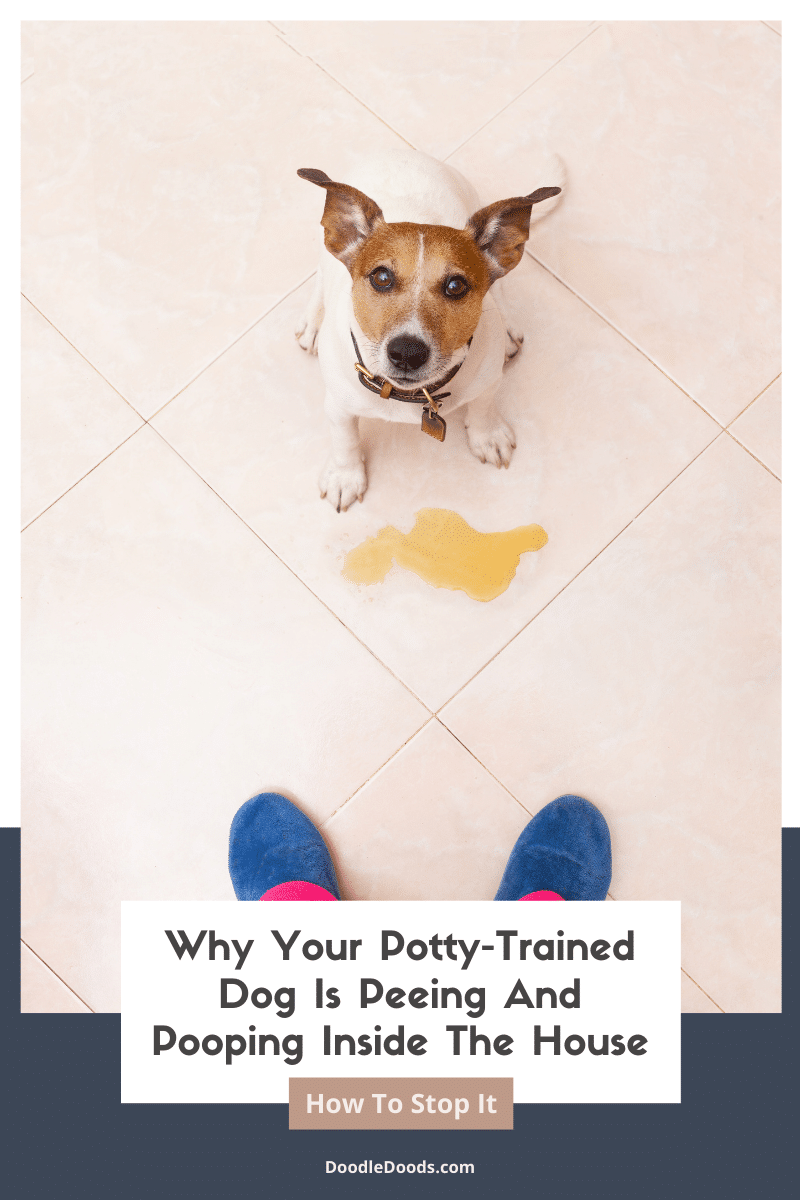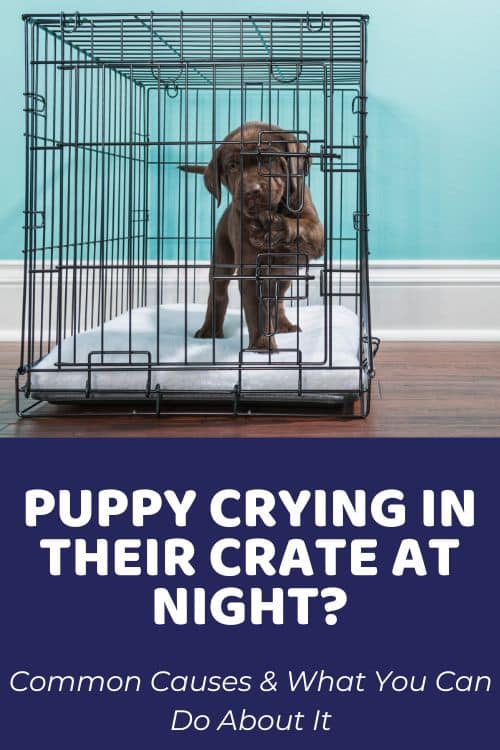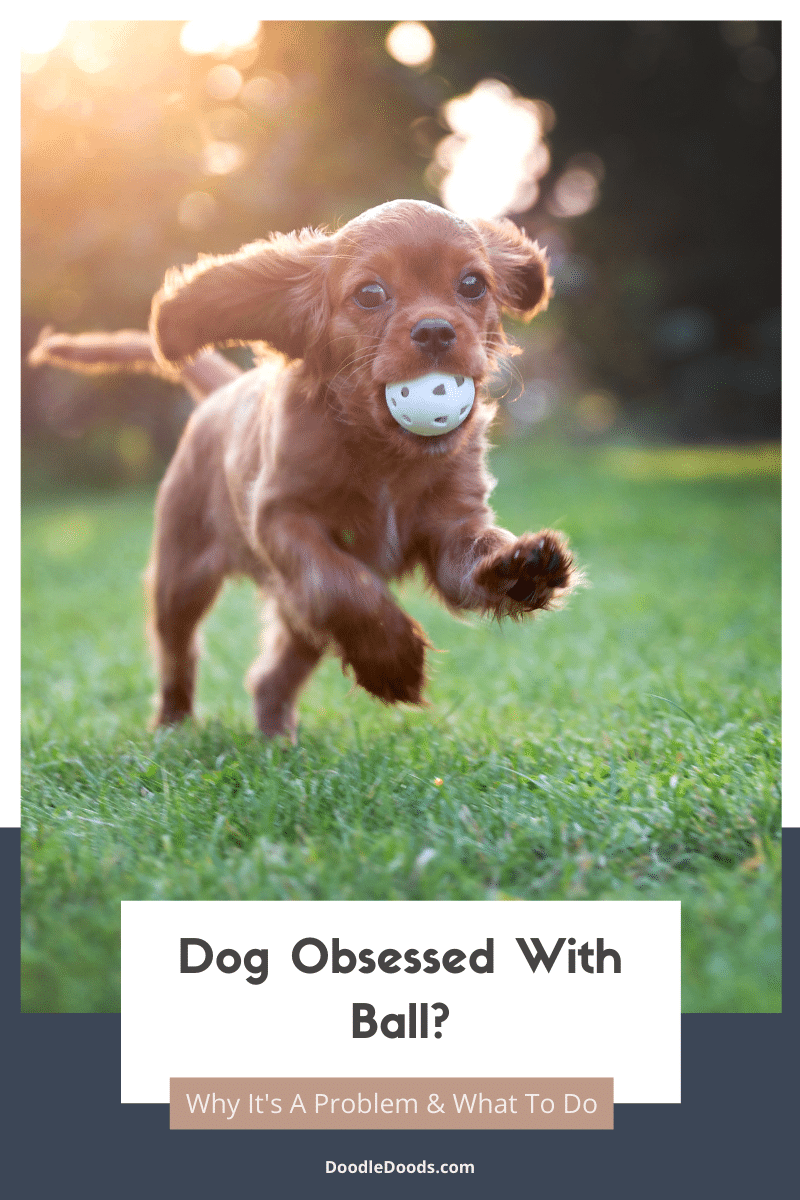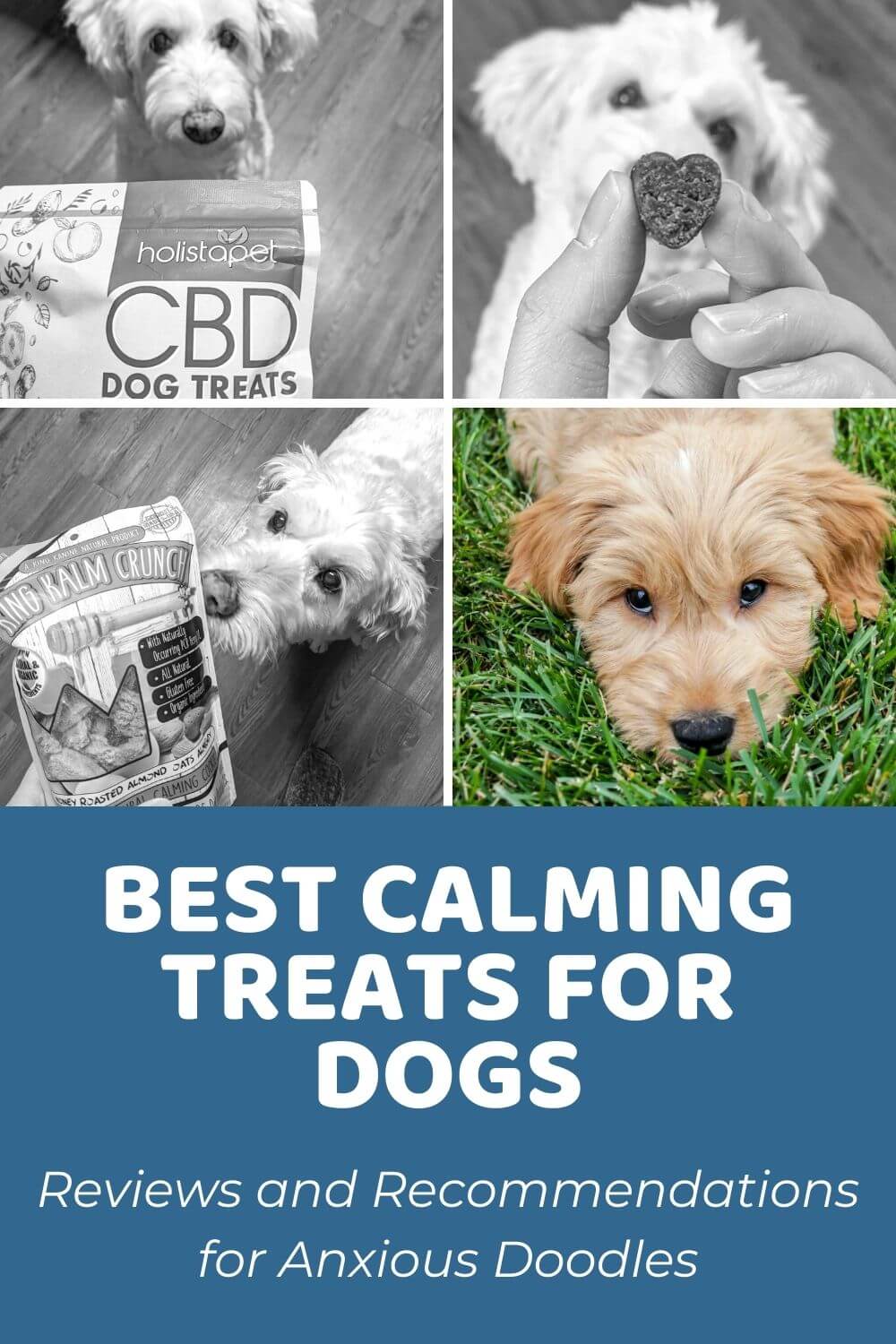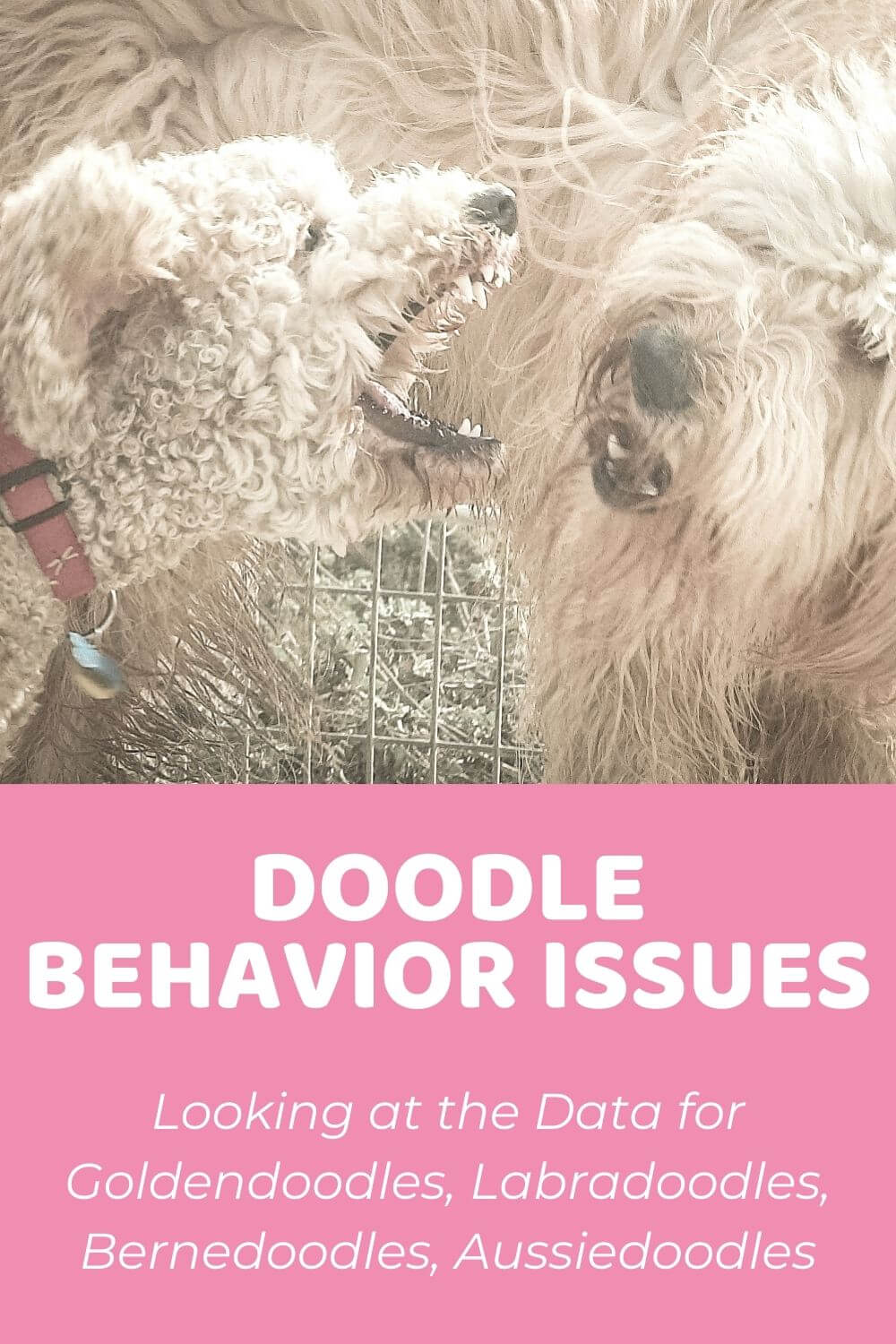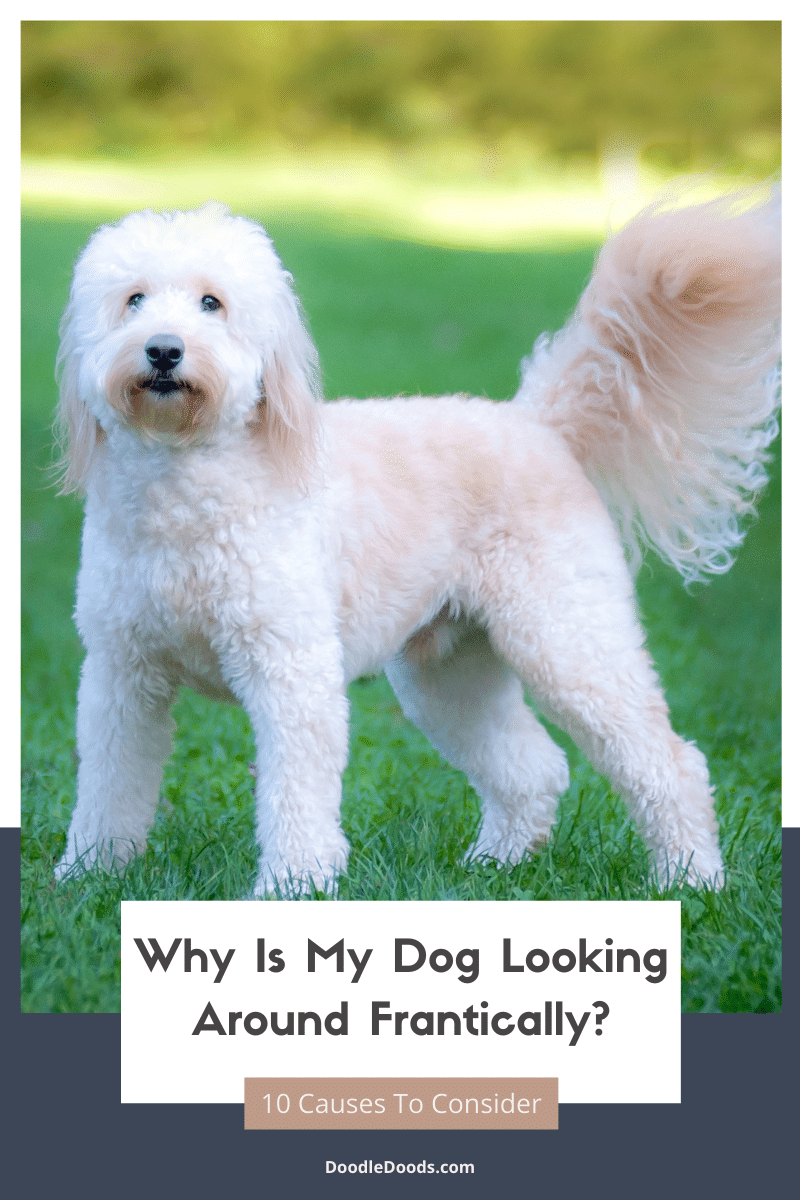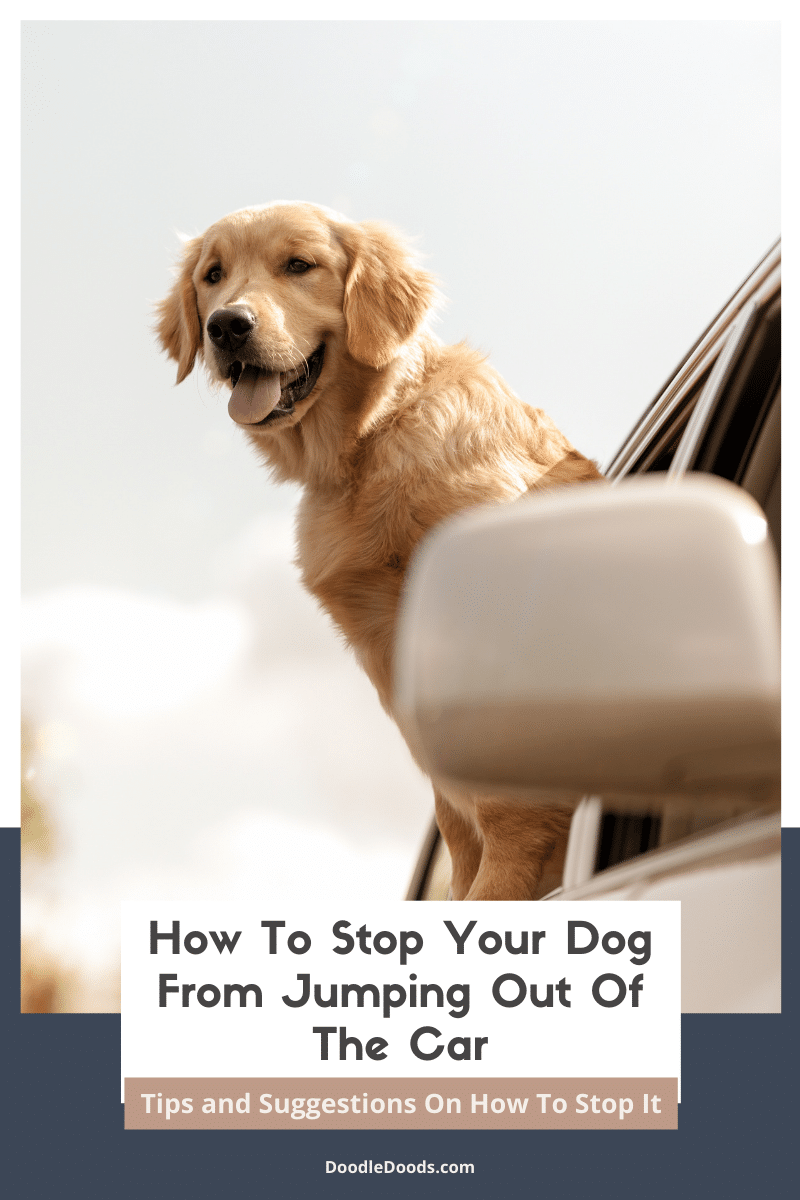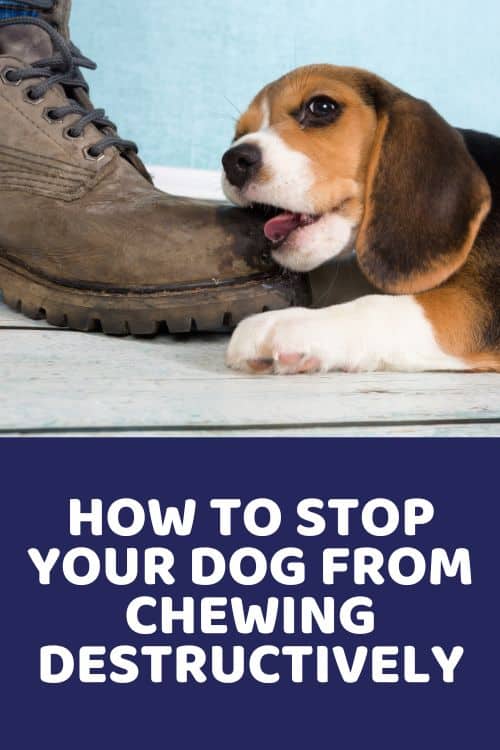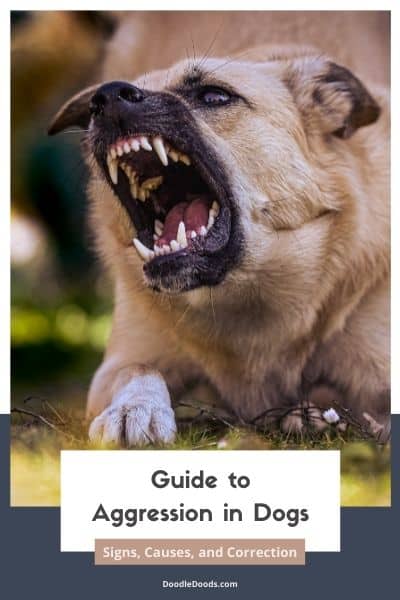If your potty-trained dog is peeing and pooping inside the house, you’re probably all sorts of confused as to why it’s happening. No one likes to see a puddle of pee or a juicy number two on their carpet or bathroom floor, albeit the latter is a slightly better option for sure.. In this guide, we’re going to discuss some of the most common reasons why your potty-trained dog might be peeing and pooping inside the house and what you can do about it. Keep on reading to learn more.
Table of Contents
- Potty-Trained Dog Peeing And Pooping Inside The House: Introduction
- Why Does My Potty-Trained Dog Keep Peeing And Pooping In The House?
- How Do I Get My Puppy To Stop Peeing And Pooping Inside?
- Potty-Trained Dog Peeing And Pooping Inside The House: FAQs
Potty-Trained Dog Peeing And Pooping Inside The House: Introduction
During the process of potty training, some accidents here and there around the house are bound to happen. Your pup is still young and learning those new behaviors and what’s expected of them. Puppies are quite similar to human babies in that sense!
But what if your seemingly potty-trained puppy is peeing and pooping inside the house? Or even a full-grown dog who’s never had issues with going potty to the right place before? After all the work you and your pooch have put into it, it can be a daunting experience having to go through all the steps yet again.
Well, for starters, there’s really no other choice than to get to the bottom of it. And if necessary, start potty training your pup again. Sometimes, this issue can be fixed quickly with a few simple steps. And other times, it could indicate that there’s a health condition that needs to be treated with the help of your pup’s vet.
Whatever the case, in this guide we’re going to help you figure out exactly what’s causing your potty-trained dog to pee and poop inside the house so that you can understand how to fix this issue as soon as possible.
By the way, we also asked our newsletter readers if their Doods have challenges with going potty inside the house. Here are the results:
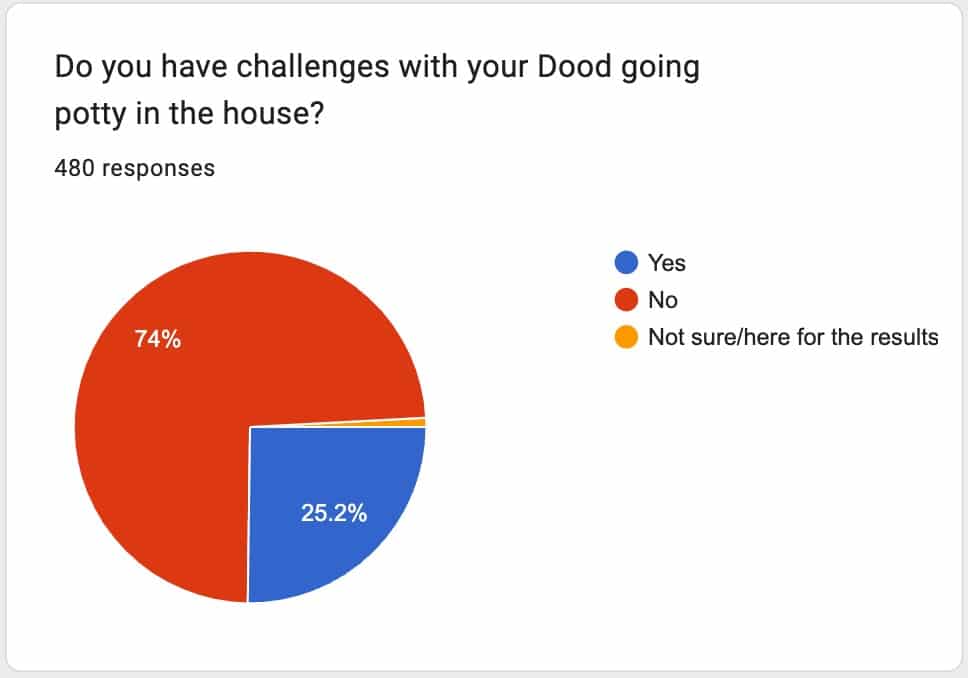
Why Does My Potty-Trained Dog Keep Peeing And Pooping In The House?
Your Dog Has Some Health Issues
It’s a natural reaction for us to get frustrated when a potty-trained dog starts peeing and pooping in the house. After all this hard work, are they doing it to just annoy us?! Well, dogs don’t usually think this way. In fact, this improper peeing and pooping can actually indicate that your dog is suffering from an underlying medical condition that requires immediate attention.
Two common health conditions that could be to blame include urinary tract infection, bladder issues, and kidney disease. While urinary tract infections can be treated with certain medications, kidney disease is unfortunately a progressive health condition that you’ll have to manage with a specific renal diet and medications. Other health conditions that could cause a potty-trained dog to pee inside the house include
When it comes to pooping inside the house, digestive upset, intestinal parasites, infections, parvovirus, and food allergies are issues to look into. Additionally, certain medications and metabolic illnesses could also cause diarrhea and improper pooping in the house.
Consider Your Dog’s Age
Issues with peeing and pooping tend to also go hand in hand with your dog’s age. It’s not uncommon for elderly dogs to suffer from incontinence, which means that they cannot hold it in as they normally were used to. Elderly dogs may also suffer from issues like cognitive decline, also known as dog dementia, leading them to be confused about where and when to go potty. In addition to that, dogs in their golden years may also develop painful arthritis that can make potty breaks more painful and difficult for them.
On the other hand, if you’ve got a younger pup that hasn’t been spayed or neutered just yet, they may be urine marking the house. This is especially common in intact male dogs, but sometimes females also mark. But to be fair, younger pups often have difficulty controlling their bladder and bowel movements, so even if your pup seems mostly house trained, they may still be struggling with the control aspect of it all.
Perhaps There Are Some Outdoor Stressors Making Your Potty-Trained Puppy Pee And Poop Inside The House?
With more shy and timid dogs, outdoor stressors could be to blame for their less than desirable potty habits. For instance, if there are loud noises outside, your pup might hate doing their business there due to fear and anxiety. Even traffic, your neighbors’ children, or other pets could trigger fear and anxiety in a dog.
Also, more excitable puppies and dogs can get easily distracted when going out for potty. Speaking of which, some pups may also exhibit what we call excitement urination – they get so excited and happy to see you or experience something that they pee right then and there, even if it’s inside the house.
By the way, some dogs just hate bad weather and they might absolutely refuse to go outside for a potty break. And you can see how they might be inclined to pee or poop in the house… If it’s super windy and cold, snowing or raining, a good doggy coat and some cute booties might do the trick.
Your Dog Is Suffering From Stress And Anxiety
Speaking of stressful situations, all sorts of different triggers could lead to stress and anxiety, and the subsequent peeing and pooping inside the house. One common cause is separation anxiety. Some breeds are more prone to separation anxiety than others, whereas some dogs develop separation anxiety due to changes in their usual daily routine.
What’s more, changes in your and your dog’s daily routine can also cause excessive stress and anxiety in your beloved pooch. For example, getting a new pet or welcoming a new baby into the family can both be triggering for your pet. Likewise, a divorce or death, renovations in your home, as well as moving can also make your pup stressed out and anxious. In some cases, even slight changes in your pup’s daily routine, such as changed bedtimes and potty breaks can cause improper peeing and pooping inside the house.
Another thing you should consider is nervous peeing, especially submissive urination. This is also more common in dogs that are more shy by nature. Oftentimes, the issues stem from their upbringing and traumatic past, so be sure to be extra gentle with your sensitive little pal.
Your Pup’s Diet Can Also Be The Culprit
If your otherwise fully potty-trained dog starts pooping inside the house, a sudden change in their diet might be to blame. For example, if you’ve bought your pup a new type of kibble, switching them from the old to the new abruptly is often bound to cause issues with their digestion. They may also suffer from diarrhea as a result, which isn’t anything nice to clean up..
Similarly, if your dog has gotten ahold of some overly fatty human foods or munched on some nasty trash, those poopy accidents and diarrhea are nothing uncommon. But just for the sake of your pup’s health and wellbeing, it might be wise to give your vet a call.
Maybe Your Puppy Is Not Properly Potty-Trained
When talking about younger dogs, we may sometimes overestimate their progress in house training. Yes, after a few months your puppy will likely be mostly potty-trained. However, some accidents may happen from time to time, especially the younger your puppy is.
Even when your puppy has been introduced to potty training while in the care of the breeder or rescue, they might not be fully house trained for up to a year. It’s important to continue potty training your new pup at home as well to ensure that those learned behaviors stick.
That being said, even a new home environment and a whole new family can make your pup take a few steps back in its potty training. Everything’s completely new for them, they likely feel a bit timid and confused in their new surroundings, and everything will take some time getting used to.
You should stay consistent and patient no matter what stage of house training your puppy is. Remember that this process takes time. You might also want to take your puppy out for potty breaks more often since puppies cannot hold it in as adult dogs can. Although you probably shouldn’t wake your young puppy at night to go potty, it might be necessary if it’s really urgent.
How Do I Get My Puppy To Stop Peeing And Pooping Inside?
Consult A Vet To Address Health And Age-Related Issues
If out of nowhere your potty-trained dog starts peeing and pooping inside the house, the first course of action would be to call your vet and book an appointment as soon as possible. We recommend you take notes of all the behavioral and physical changes you’ve noticed in your dog so that your vet has an easier time assessing and diagnosing them.
As we discussed earlier, various illnesses like urinary tract infections or arthritis, intestinal parasites, or age-related issues can all cause sudden change in your dog’s bathroom habits. But if you tackle those issues early on with proper veterinary care, they can be treated or managed so that your pup can continue on enjoying their best, most fulfilled life. And you won’t have to clean up those messes constantly, either.
Change Your Pup’s Diet Gradually Over Time
If your dog has been eating the same type of wet food or dry kibble for a while, it’s crucial that you don’t switch them to another formula too quickly. Even if you’re planning to feed your dog the same kibble, just with a different source of protein, you should make the change gradually and over a period of time.
Usually, a good way to go about this is to gradually switch one food for another over the duration of one week. So, on day one, you’ll prepare a bowl with 75% of the old kibble and add the remaining 25% of the new kibble. On day two, the mix can be 70-30, and by day three, you can do 60-30, and so forth.
Just make sure that you’re feeding your dog the right amount of food according to their size and age. As you’re mixing two different formulas, pay close attention to both of the formulas’ caloric content.
Follow A Daily Schedule
A daily routine is so important for our furry best pals, regardless of their age. Having set times for your dog’s potty breaks and meals is essential in house training, so that can massively help when struggling with improper peeing and pooping in the house.
For young puppies, this helps build their confidence and make them feel more secure and safe in their new home and family. But it’s also excellent for teaching a young pup at what times they can expect to go potty, have a meal, or take a nap. Their bodies will naturally adjust to a daily schedule so be sure to follow it as closely as possible every single day of the week.
But as we discussed before, sudden changes in an adult dog’s routine can also cause issues with their usual bathroom habits. They might be confused as to when it’s time for potty and when it’s time for a meal. This often happens during the holidays and especially if you’re hosting parties at home. So try to keep your pup on a similar schedule as much as possible.
Clean Up The Messes Immediately
Cleaning up your dog’s urine and poop immediately tackles a few issues at once. For starters, this helps you get rid of as much of the odor and stains as possible. The longer you let it seep into your floors or carpets, the harder it is to get it out.
Secondly, if you clean up those accidents as soon as humanly possible, your pup is less likely to start going potty to the same area again. We’ve seen it all too many times when a pup has gone potty to an area in the house, the aroma starts to linger, and the next time they know exactly where to do the deed again!
However, not all cleaning products will do. We recommend getting a proper odor eliminating enzymatic cleaning product that’s targeted for this very purpose. Our guide No More Dog Urine Smell: A Guide To Cleaning And Deodorizing Your Carpets And Furniture also has some excellent tips on how to remove both fresh and old urine stains out of the carpet with some simple household ingredients.
Minimize Stress And Anxiety
If your potty-trained dog is peeing and pooping inside the house due to stress or anxiety, it’s vital that you try to minimize those triggers as much as possible. You should learn your pup’s behavior and understand what exactly is triggering them so that you know what triggers to avoid and what you should work on with your pooch. Desensitization and counterconditioning can be of help in certain instances.
In case of separation anxiety, prevention is always better than cure. However, if your pup is already struggling with this issue, it’s important for you to gently teach your dog to enjoy spending time alone. Crate training can also be extremely helpful with that. Plus, if your pup is crated whilst home alone, they won’t be able to pee and poop around the house, either.
In addition to that, you can consult with your vet about calming products like CBD treats and oils as well as specific medications. These are usually helpful in situations where you know in advance that your pup is likely going to get a bit anxious.
Encourage Peeing And Pooping While You’re Outside
Sometimes puppies and adult dogs can get a bit too carried away when they’re supposed to go potty outside. With all the interesting sights and smells, it’s no surprise that their attention may start to diffuse away from the task.
A helpful trick is to immediately take your pup out to their designated potty spot and bring along some tasty treats. Before you let your dog romp around and play, encourage them to go potty in their potty spot. Don’t get too enthusiastic, as your dog may take it as an invitation for play instead. So, stay there for a few minutes silently and let your dog pee or poop. Once your dog has finished its business, give them a few treats and calm praise so that they learn to understand what’s expected of them in that spot. If, however, you feel like your pup didn’t empty its bladder fully or didn’t poop, leave the potty area for 15-20 minutes and come back there again after a while.
Get Help From A Certified Trainer
If you’ve tried all of the steps above or simply would like to get some extra guidance, we recommend you consult with professionals. Baxter & Bella’s Online School is a great program for both puppies and adult dogs, as it covers all the basic training techniques like potty training or obedience training, and it has countless resources on various behavioral issues.
On the other hand, if you’re looking for some one on one guidance for your lil’ pooch, then you might want to consider hiring a local dog trainer in your area. Indeed, this will likely cost a bit more than the one-time subscription fee for the online puppy school, but your pup might benefit from some individual help.
Potty-Trained Dog Peeing And Pooping Inside The House: FAQs
Indeed, vinegar can be an excellent deterring aid to keep your dog from pooping inside the house. Dogs notoriously hate the smell of vinegar and tend to avoid areas where it’s been sprayed on. If there’s a spot inside the house where your dog has pooped, you should consistently spray it with vinegar so that the smell of vinegar lingers in that area. It’s also great at removing those nasty odors. Also, be sure to thoroughly clean the area immediately after your pup has had an accident there. After that, you can spray the vinegar.
This could mean that your puppy isn’t actually fully potty-trained just yet. Since puppies tend to pee more often than they poop, they might have only learned the association of peeing outdoors, but not pooping there. Also, they may struggle with pooping outside if they’re scared of something while out and about. That’s often the case as pooping does take more time than a quick pee pause. Also, some pups simply don’t have enough time to do their poopy business outside – they may get distracted by all the new smells and sounds so that they won’t actually get any peeing or pooping done.
Potty training a dog takes time, and quite a lot of time to be honest! Usually, puppies are fully potty-trained by 6 months of age, give or take. For some it could take as little as 4 months, whereas for others it could take up to 12 months. On the other hand, puppies are generally *mostly* house trained within a few months. That’s not to say any accidents won’t happen after that, but they’ll likely have a better grasp of controlling their bladder and bowel movements as they grow older.
Want to Learn
DIY Doodle Grooming?
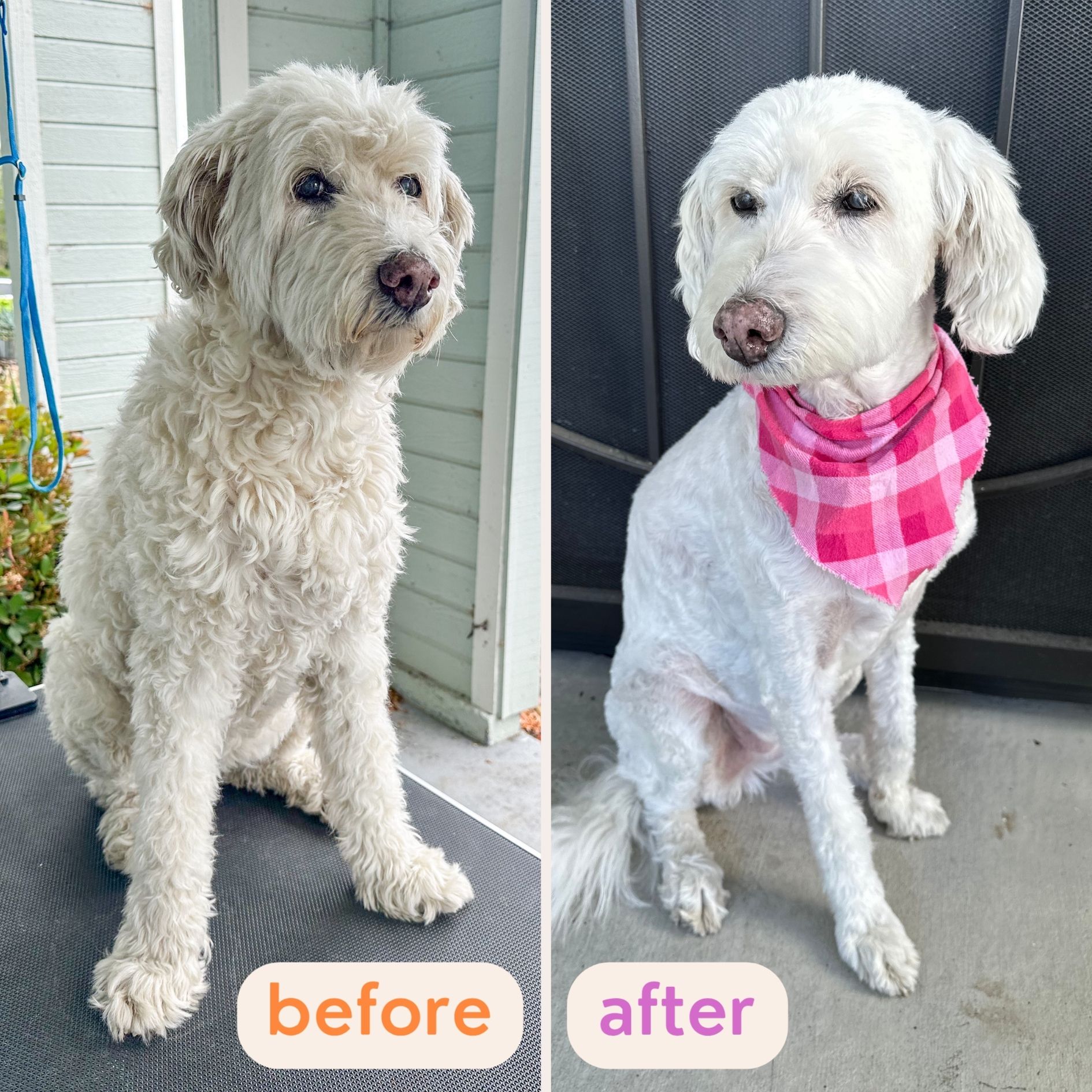
 “Every concern and question I had now has clear, practical solutions.” – Paula D.
“Every concern and question I had now has clear, practical solutions.” – Paula D.
 “These lessons have provided tremendous amounts of information.” – Steve B.
“These lessons have provided tremendous amounts of information.” – Steve B.
 “Buy the course and complain about how easy it is!” – Chris S.
“Buy the course and complain about how easy it is!” – Chris S.
Learn How To Groom Your Doodle At Home…
Safely…And Without Confusion:
Potty-Trained Dog Peeing And Pooping Inside The House: Final Thoughts
It’s certainly not pleasant having to deal with a potty-trained dog peeing and pooping inside the house. You’ve done the legwork, your pup has done their part, what’s it about?! Regardless of why your pup might be doing it, there’s always a solution to this problem. We hope you learned some helpful tips and tricks on how to prevent those accidents in the house. Just remember to stay patient and consistent and whenever in doubt, consult with your vet to rule out any potential medical issues.

